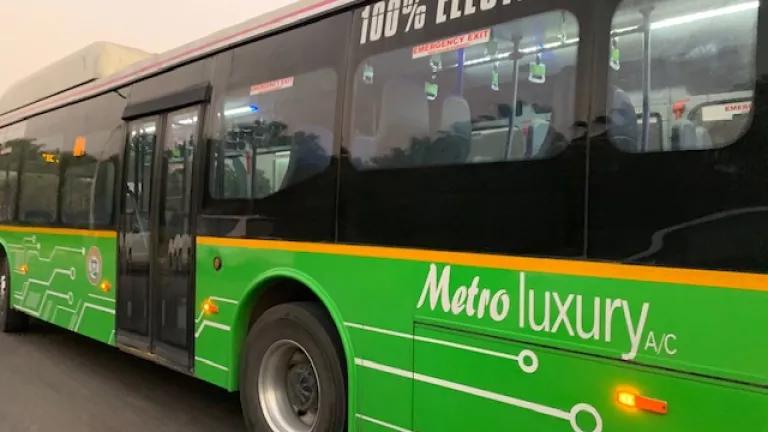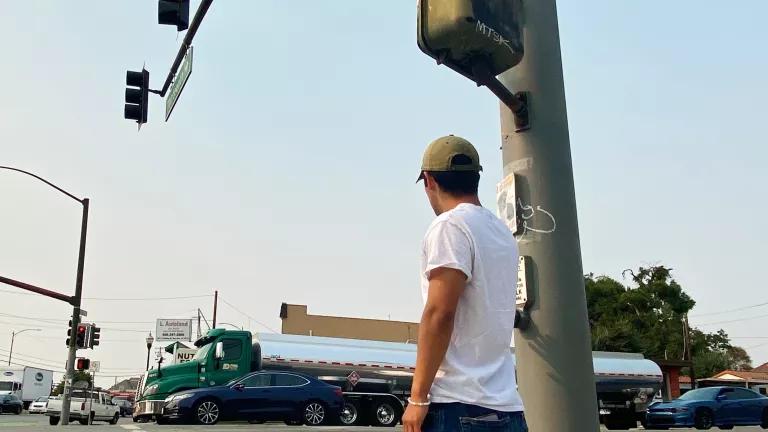Electric Mobility: U.S.-India State Level Knowledge Exchange
Electric mobility is a growing priority for national and state governments around the world.

EV Bus at Hyderabad Airport
Co-authored with Professor Rajkiran Bilolikar
Electric mobility is a growing priority for national and state governments around the world. The main drivers for advancing electric vehicles (EVs) is to save costs, lower emissions, reduce pollution, increase energy independence, and combat climate change. State EV policies are a major catalyst for advancing EV consumer demand, manufacturing, and job creation. To bolster state-to-state learning, the “Telangana-Colorado Strategic Knowledge Exchange Roundtable on Electric Mobility” brought together state officials to share experiences on advancing EVs during and after the COVID-19 pandemic.
Subnational cooperation between the United States and India remains a crucial mainstay of long-term economic growth, sustainable technology innovation, industrial development, and entrepreneurship. Telangana and Colorado are electric mobility leaders that have made important strides in advancing clean vehicle policies. Shared interests between the two states cover diverse matters and allow them the benefit of exploring policy, technical, and commercial ties.
In August 2020, Telangana approved the new Telangana State Electric Vehicle and Energy Storage Solution Policy at the cabinet level. The new policy aims to make Telangana a preferred destination for EVs, component manufacturing units, and make the state a major base for EV and energy storage sectors. Telangana proposes to develop an ecosystem of shared mobility through proactive support for charging infrastructure and swapping infrastructure, and proactively supports research and development.
With approximately 30,000 registered EVs, Colorado is among the top 10 US states in terms of electric vehicle adoption per capita. The state plans for more light duty EVs on the road - 940,000 by 2030. The state has made investments to install 351 EV chargers. The state has recently announced its 2020 EV plan with the vision to have “Large-scale transition of Colorado’s transportation system to zero emission vehicles, with a long-term goal of 100% of light-duty vehicles being electric and 100% of medium- and heavy-duty vehicles being zero emission”.
Telangana-Colorado Strategic Knowledge Exchange Roundtable on Electric Mobility
The Administrative Staff College of India (ASCI), the Center for Strategic & International Studies (CSIS) and NRDC partnered to host the virtual roundtable this week. The closed-door discussion brought together government officials from Colorado and Telangana to share ideas on electric mobility and public policy to discuss how the states can move ahead to meet state-specific transport electrification goals during the COVID-19 pandemic and beyond. Given the closed-door session, the points that have been publicly discussed are highlighted below.
The key points highlighted by each state during the roundtable included:
Telangana EV Highlights
- Reduce transportation costs for public through electric mobility
- Prioritize electric 3-wheelers, 2-wheelers and buses
- Create robust EV charging infrastructure both on roads and at home
- Attract business for large-scale EV manufacturing, battery storage and deployment
- Support research and development for electric mobility and battery storage
Colorado EV Highlights
- Achieve Colorado goal of 100% renewable energy by 2040
- Prioritize electrification of vehicles in the state
- Strengthen zero emission vehicles (ZEV) programs for sales of vehicles
- Expand public awareness and marketing campaign to increase EV demand
- Ensure ubiquitous EV charging infrastructure through utility and grant programs
The COVID-19 economic downturn and related stimulus needed to rebuild the economy present an opportunity to support consumers, jobs and automotive manufacturing through investment in electric mobility. State-to-state knowledge exchange will help advance electric mobility as part of the economic recovery, and help achieve goals to create jobs, reduce air pollution, and combat climate change.
Rajkiran Bilolikar is an Associate Professor with the Administrative Staff College of India in Hyderabad specializing in electric mobility and clean energy.

Rajkiran V Bilolikar



